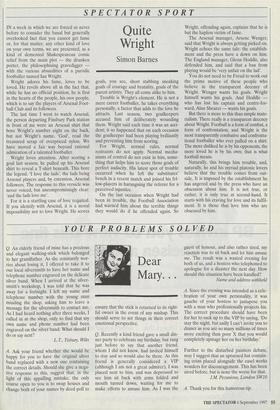SPECTATOR SPORT
Quite Wright
Simon Barnes
IN a week in which we are forced as never before to consider the banal but generally overlooked fact that you cannot get fame or, for that matter, any other kind of love on your own terms, we are presented, as a kind of demented Shakespearean comic relief from the main plot — the drunken porter, the philosophising gravedigger with the various absurdities of a parodic footballer named Ian Wright.
Wright adores his fame, loves to be loved. He revels above all in the fact that, while he has no official position, he is first in the hearts of the people, his own people, which is to say the players of Arsenal Foot- ball Club and its followers.
The last time I went to watch Arsenal, the person departing Finsbury Park station in front of me wore an Arsenal shirt that bore Wright's number eight on the back, but not Wright's name. 'God', read the treasured scrap of overpriced nylon. We have moved a fair way beyond rational admiration of a talented footballer.
Wright loves attention. After scoring a goal last season, he pulled up his Arsenal shirt to reveal a T-shirt beneath. This bore the legend, 'I love the lads', the lads being Arsenal players and, by extension, Arsenal followers. The response to this versicle was never voiced, but uncompromisingly clear: `and the lads love me'.
For it is a startling case of love requited. If you identify with Arsenal, it is a moral impossibility not to love Wright. He scores goals, you see, short stabbing sneaking goals of courage and brutality, goals of the purest artistry. They all come alike to him.
Trouble is Wright's element. He is not a mere career footballer, he takes everything personally, a factor that adds to the love he attracts. Last season, two goalkeepers accused him of deliberately wounding them. Wright said each time it was an acci- dent; it so happened that on each occasion the goalkeeper had been playing brilliantly and preventing him from scoring.
For Wright, normal rules, normal restraints do not apply. Normal mecha- nisms of control do not exist in him, some- thing that helps him to score those goals of perfect audacity. His latest spot of trouble occurred when he left the substitutes' bench in a recent match and joined his fel- low-players in haranguing the referee for a perceived injustice.
On the last occasion when Wright had been in trouble, the Football Association had warned him about the terrible things they would do if he offended again. So Wright, offending again, explains that he is but the hapless victim of fame.
The Arsenal manager, Arsene Wenger, said that Wright is always getting picked on. Wright echoes the same tale: the establish- ment and the press have a down on him. The England manager, Glenn Hoddle, also defended him, and said that a ban from playing would be 'very unfair on the lad'.
You do not need to be Freud to work out the prime motive of these people who believe in the transparent decency of Wright. Wenger wants his goals. Wright himself wants his goals. And Hoddle who has lost his captain and centre-for- ward, Alan Shearer — wants his goals.
But there is more to this than simple mate- rialism. There really is a transparent decency about Wright. Football is a form of combat, a form of confrontation; and Wright is the most transparently combative and confronta- tional footballer who ever pulled on a shirt. The more disliked he is by his opponents, the more loved he is by his own; that is what football means.
Naturally, this brings him trouble, and, naturally, he and his myriad platonic lovers believe that the trouble comes from out- side. It is imposed by the establishment he has angered and by the press who have an obsession about him. It is not true, or rather, it is only true at second-hand. It starts with his craving for love and its fulfil- ment. It is those that love him who are obsessed by him.


























































 Previous page
Previous page